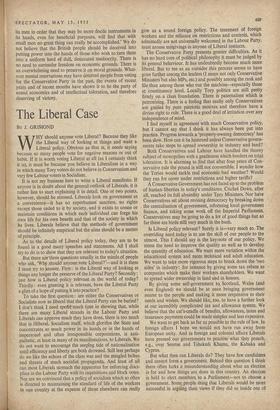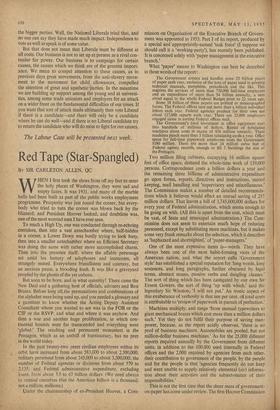The Liberal Case
BY J. GRIMOND WHY should anyone vote Liberal? Because they like the Liberal way of looking at things and want a Liberal policy. Obvious as that is, it needs saying because so many people vote for negative reasons or out of habit. If it is worth voting Liberal at all (as I certainly think it is), it must be because you believe in Liberalism in a way in which many Tory voters do not believe in Conservatism and very few Labour voters in Socialism.
It is not my business here to write a Liberal manifesto. If anyone is in doubt about the general outlook of Liberals, it is rather late to start explaining it in detail. One or two points, however, should be stressed. Liberals look on government as a convenience—it has no superhuman sanction, no rights except those ceded to it by society, and it exists to create or maintain conditions in which each individual can forge his own life for his own benefit and that of the society in which he lives. Liberals believe that the methods of goverthent should be infinitely empirical but the aims should be a matter of principle.
As to the details of Liberal policy today, they are to be found in a good many speeches and statements. All I shall try to do is to show that they are relevant to today's situation.
But there arethree questions usually in the minds of people who ask, 'Why should anyone vote Liberal?'—and it is these I must try to answer. First : is the Liberal way of looking at things any longer the preserve of the Liberal Party? Secondly: just how is Liberal policy relevant in the world of today? Thirdly : even granting it is relevant, have the Liberal Party a glint of a hope of putting it into practice?
To take the first question : are either the Conservatives or Socialists now so liberal that the Liberal Party can be buried? I don't think I need spedd'much time in showing that, while there are many Liberal strands in the Labour Party and Liberals can approve much they have done, there is too much that is illiberal. Socialism itself, which glorifies the State and concentrates, so much power in its hands or in the hands of impersonal and often irresponsible corporations, is anti- pathetic, at least in many of its manifestations, to Liberals. We do not want to encourage the seeping tide of nationalisation until efficiency and liberty are both drowned. Still less perhaps do we like the echoes of the class war and the mingled bribes and threats of much socialist propaganda. And least of all can most Liberals stomach the apparatus for enforcing disci- pline in the Labour Party with its inquisitions and block votes.
Nor arc we convinced that a policy of socialism which so often is directed to maintaining the standard of life of the workers in one country at the expense of those elsewhere can really give us a sound foreign policy. The treatment of foreign workers and the reliance on restrictions and controls, which admittedly are not universally welcomed in the Labour Party, must arouse misgivings in anyone of. Liberal instincts.
The Conservative Party presents greater difficulties. As it has no hard core of political philosophy it must be judged by its general behaviour. It has undoubtedly become much more liberal. But to me as an outsider this process seems to have gone farther among the leaders (I mean not only Conservative Ministers but also MPs, etc.), and possibly among the rank and file than among those who run the machine—especially those at constituency level. Locally Tory politics are still pretty firmly on a class foundation. There is paternalism which is patronising. There is a feeling that really only Conservatives are guided by pure patriotic motives and therefore have a divine right to rule. There is a good deal of irritation over any independence of mind.
I find myself in agreement with much Conservative policy, but I cannot say that I think it has always been put into practice. Progress towards a 'property-owning democracy' has been slow. How can it be hastened unless Conservative govern- ments take steps to spread ownership in industry and land? Both Conservatives and Labour have handled the thorny subject of monopolies with a gentleness which borders on total toleration. It is alarming to find that after four years of Con- servative rule the pound is still not convertible. I wonder how the Tories would tackle real economic bad weather? Would they run for cover under restrictions and higher tariffs?
A Conservative Government has not faced up to the problem of human liberties in today's conditions. Crichel Down, after all, reached its full absurdity under Tory Ministers. Nor ha'Ve Conservatives set about revising democracy by breaking down the centralisation of government, reforming local government finance, and taking some work off the Imperial Parliament. Conservatives may be going to do a lot of good things but so far these are birds still very much in the bush.
Is Liberal policy relevant? Surely it is—very much so. The overriding need today is to use the skill of our people to the utmost. This I should say is the key-note of our policy. We stress the need to improve the quality as well as to develop the quantity of education. We want more variation within the educational system and more technical and adult education. We want to take more vigorous steps to break down the 'two sides' in industry : for instance by giving some tax rebate to companies which make their workers shareholders. We want to spread wider ownership in land and in houses.
By giving some self-government tg Scotland, Wales (and even England) we should be at once bringing government nearer to the people and making it more responsive to their needs and wishes. We should like, too, to have a further look at our incredibly complicated tax and allowance system. We believe that the cat's-cradle of benefits, allowances, taxes and insurance payments could be made simpler and less expensive. We want to get back as far as possible to the rule of law. In foreign affairs I hope we would not have run away from European unity. And in foreign and colonial affairs Liberals have pressed our governments to practiSe what they preach, e.g., over Seretse and Tshekedi Khama, the Kabaka and Cyprus.
But what then can Liberals do? They have few candidates and cannot form a government. Behind this question I think there often lurks a misunderstandiag about what an election is for and how things are done in this country. An election is held to elect members to a Parliament—not to choose a government. Some people thing that Liberals would be more successful in arguing their views if they did so inside one of the bigger parties. Well, the National Liberals tried that, and no one can say they have made much impact. Independence to vote as well as speak is of some value.
But that does not mean that Liberals must be different at all costs. Our business is not to set up at present as a rival con- tender for power. Our business is to campaign for certain causes, the causes which we think are of the greatest import- ance. We mean to compel attention to these causes, as in previous days great movements, from the anti-slavery move- ment to the movement for child allowances, compelled the attention of great ,and apathetic parties. In the meantime we are building up support among the young and at universi- ties, among some trade unionists and employers for an attack on a wider front on the fundamental difficulties of our times. If you want that sort of attack made ultimately then vote Liberal if there is a candidate—and there will only be a candidate where he can do well—and if there is no Liberal candidate try to return the candidate who will do most to fight for our causes.
The Labour Case will be presented next week.



































 Previous page
Previous page